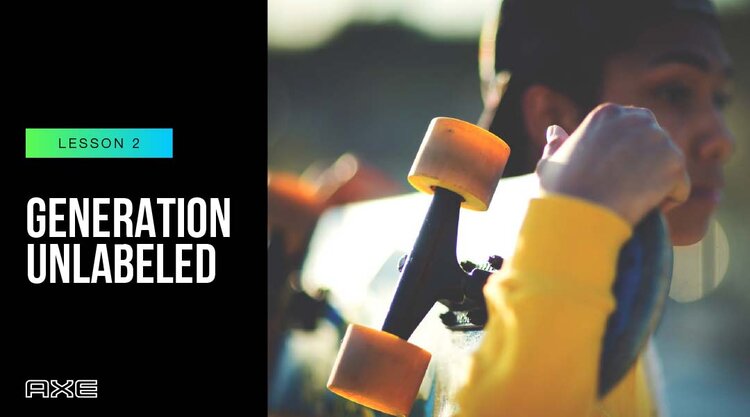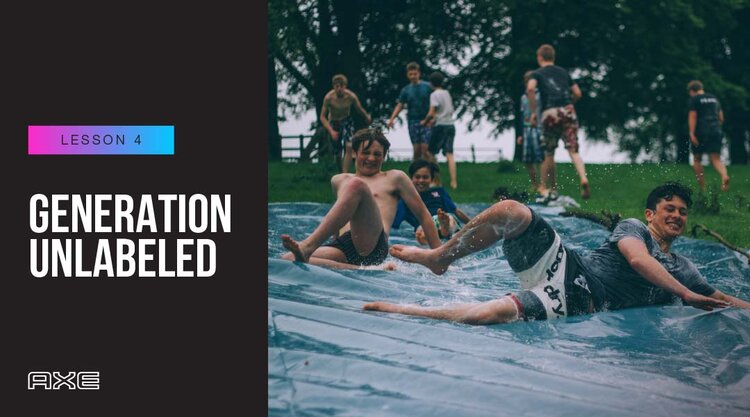AXE Generation Unlabeled
Generation Unlabeled is a curriculum comprised of five, no cost, interactive lessons that cover a range of topics – from toxic masculinity and gender stereotypes to inclusivity. The program asks middle school students to analyze today’s society and culture, themselves, and conclude with a call to action, like revising a school policy to be more inclusive.

What is Generation Unlabeled?
Each lesson is intended to be implemented in about 55 minutes and contains:
- Educator’s Guide
- Presentation
- Activities and Handouts
The lessons were developed by Cairn Guidance, reviewed by a group of national experts and piloted with over 800 middle school students across the country. Generation Unlabeled is a collaboration between Cairn Guidance and AXE, with generous funding provided by AXE.
Why was Generation Unlabeled created? I want to know more!
AXE wants young men to grow up confident in their own brand of masculinity. However, they recognized that some of the ads they created in the early 2000’s negatively reinforced stereotypes that would not be acceptable by today’s standards. In 2015, AXE went back to better understand the effects of negative stereotypes on their core young male audience. Partnering with Promundo, a global research leader, they conducted a study and found that 72% of young guys reported being put in the “Man Box,” a set of beliefs about masculinity that place pressure on men to act a certain way. Along with other findings, this statistic helped AXE reinforce their core mission to inform young men that there’s no one way to be a man.
Armed with research, they re-worked their marketing campaigns to champion a portrayal of guys that don’t fit traditional standards of masculinity (see “Is It Ok For Guys…” on YouTube). From there, AXE brought this message into high schools through their Senior Orientation program, an in-school workshop that encourages students to shape their school culture through self-expression and inclusivity.
Building on the success of its Senior Orientation programs, AXE wanted to reach students at an earlier age before they’re exposed to the social pressures of high school with the creation of this specialized curriculum implemented in middle school health classes across the nation. Generation Unlabeled’s interactive lesson plans cover a range of topics – from toxic masculinity and gender stereotypes to inclusivity – asking students to analyze today’s society and culture, themselves, and conclude with a call to action, like revising a school policy to be more inclusive. By directly educating teens and empowering young men to define what masculinity means for themselves, the goal is to foster the first generation of students to grow up in a society without toxic masculinity.
Want the no-cost lessons? Email info@cairnguidance.com and we will send you the materials.
What are the learning objectives for each lesson?

Lesson 1
The lesson will:
- Introduce students to terms and definitions related to gender.
- Explore where gender expectations are developed.
- Examine what internal and external influences are.
- Identify ways in which gender expectations may be harmful.

Lesson 2
The lesson will:
- Introduce students to the Man Box.
- Identify potential short and long-term impacts that being in the Man Box can impose on those inside and outside the Man Box.

Lesson 3
The lesson will:
- Examine how internal and external influences contribute to gender expectations.
- Create awareness of student’s experiences relative to gender expectations.
- Explore the personal impact gender expectations have on students and their peers.

Lesson 4
The lesson will:
- Create awareness of what it feels like to be excluded.
- Examine how fears related to differences and/or gender expectations may impede communication and relationships.
- Promote the importance of building relationships based on respect for others despite differences including gender.
- Introduce strategies for communicating with and supporting each other.

Lesson 5
The lesson will:
- Have students participate in an individual, group or classroom-based performance assessment advocating for the health and well-being of peers related to gender expectations.
